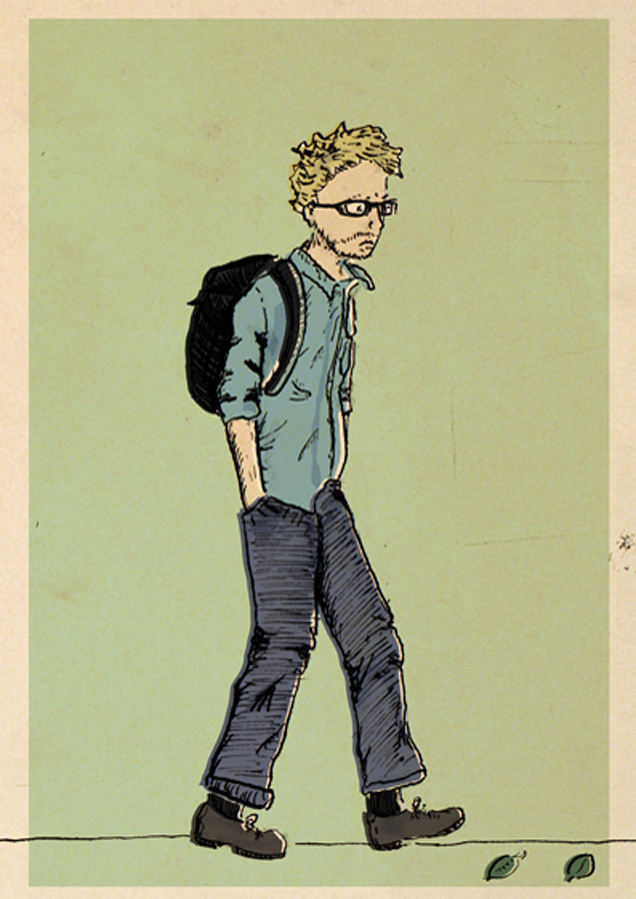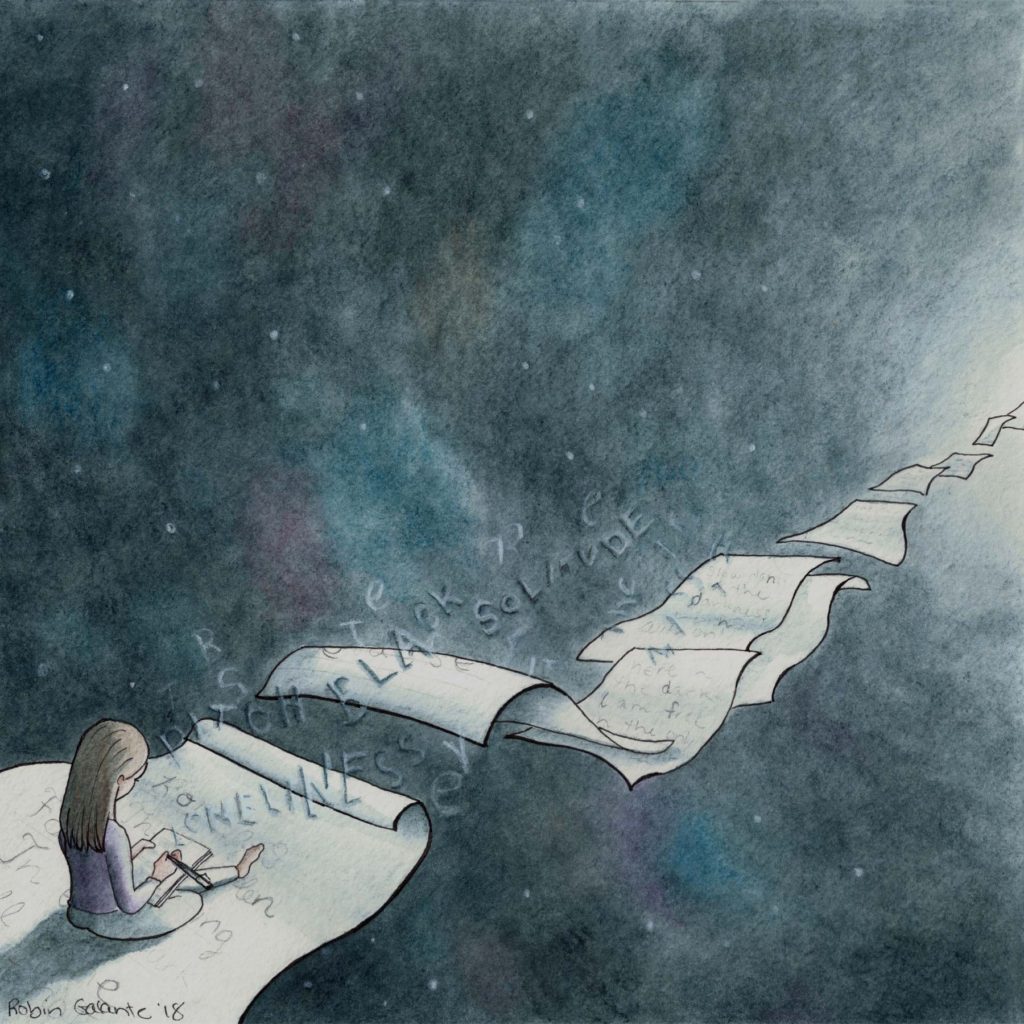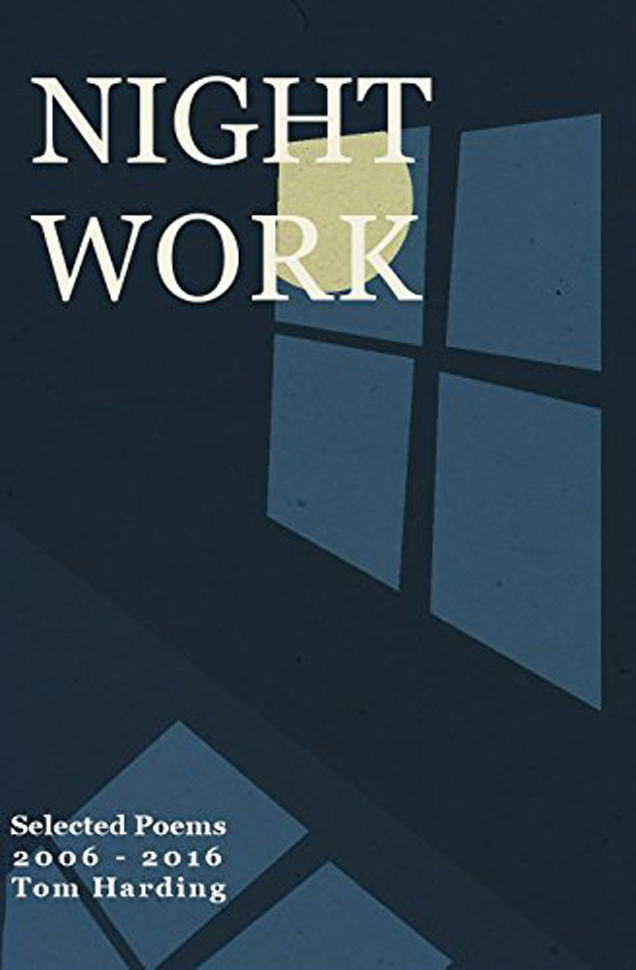Clocks tick. Floorboards creak, water pipes grumble. Tinnitus throbs like a whistling kettle, and thoughts intensity: niggles become crises. Orange streetlamps, eventually, are dimmed by silver dusk. The relentless, clanging alertness of insomnia is a sensory assault, an agonising void in which the miniscule becomes mighty.

The exaggerated emotions and heightened sensibilities of the sleepless night are encapsulated evocatively in After Lights Out, a collaboration between Northampton poet Tom Harding – who reads verse from his own nocturnally-themed collection Night Work – and musical collective Capac, who provide a sensitive selection of ambient musical accompaniment. It was an alliance mooted after Capac‘s Stuart Cook heard Tom’s poetry recitals on the Nocturne podcast, and was struck by the inherent musicality of his verse.
I asked Tom about the background to both Night Work, and After Lights Out:
Bob: The obvious question to ask – do you suffer from insomnia yourself?
Tom: I’ve suffered from insomnia periodically over the years. I thought I’d got it licked but the recent lockdown seems to have summoned it back, and I understand there are a few people in the same boat.
So are you able to use the night-time creatively? Did you actually write lots of the poetry on this album during the small hours themselves?
The poems in this collection cover a ten year period. The early ones I wrote in my twenties, when I would think nothing of staying up until 4am writing, even when I had work the next day. The thought of that now makes me shudder. In recent years, sleepless nights have been caused by my three-year-old. I’ve written a lot of poems on my phone while my son slept on my shoulder, and it reminded me of how intimate the hours are between midnight and 4am.

I always think there’s a mental mindset during a sleepless night that exists at no other times of our lives: and I’ve tried hard to describe it – that combination of exhaustion while being deluged with uncontrollable thoughts. Do you have similar feelings?
In recent years I’ve been conditioning myself to ignore my thoughts… something that’s easier said than done. When you’re young, you treat your inner voice as being somehow holy, as if it’s the essence of who you are, and you ignore its message at your peril. But this can lead to an over-reliance on the thinking mind. Thoughts are little dictators of the mind, and if you’re not careful you can spend your conscious life falling victim to fictitious narratives of your own creation.
It’s very freeing when you realise that your internal monologue doesn’t need to be trusted, that it’s less like your immortal soul and more like a panicky flatmate or a broken radio. The noise of daytime often drowns it out, but at night-time it leaks in.

There are mentions of spiders on this album – are you an arachnaphobiac, by any chance?
Yes, that must have crept in somehow. It wasn’t a conscious addition. Some of my most panic-stricken memories are of lying awake, conscious there was a spider in the room.
And a related stab in the dark… there’s the recurring phrase “Spider and I” on the album too, which is the name of a track on one of my favourite albums, Brian Eno’s Before and After Science. Was that a deliberate reference?
No… strangely, I know the song but I hadn’t made that connection. I like that album a lot. Nice to tie a spider’s web between the two.
And on the off-chance… have you ever suffered from hypnagogic or hypnopompic hallucinations? I do sometimes, and again… it’s always spiders. I wake up screaming in the bathroom sometimes.
I have something, but I’m uncertain of its name. I know that I’m awake, so I’m not being fooled as you might be by a hallucination. Instead it’s a type of vivid and spontaneous imagery that emerges when I shut my eyes in the hour before sleep. I brought this up recently with my family, thinking everybody must have this – but that doesn’t seem to be the case. I take it to be the dreaming mind warming up. Kind of like the trailers, before the main show.
There’s a recurring sound motif of controlled breathing on the album: did that come from Capac, or from you? Just interested, as I remember as a kid trying to get to sleep by breathing very slowly and deliberately, and I still do that sometime…
That’s all Capac and it’s a great motif, I agree. I practice mindfulness, and following the breath is central to this. It’s the first place I go to, and the anchor I base it around. It allows you to crawl out from under the chaos and fly above it. The challenge is to allow your body to relax enough, so that your conscious mind doesn’t try to control the breath.
I also love your encapsulation of the heightened sensory experience of sleeplessness: ‘Night Noises’. What do you tend to hear when you can’t sleep? And do you convince yourself that it’s something far more sinister than the reality?
We live in a quiet neighbourhood, so it’s mostly owls or cats and the odd distant siren. We lived for a long time above a four-way street in North London, so what we often heard in actuality was as bad as our imaginations.
The album is based on your poetry collection, Night Work – so how did the collaboration with Capac come about? I read that Capac’s Stuart Cook heard you on a podcast – did you know him prior to that?
No, Stu had listened to the Nocturne podcast and heard me on there. One good thing leading to another.
[NB Nocturne is a really rather delightful “audio essay” podcast exploring different aspects and notions of the night-time… the episode featuring Tom dates from January 2019, and can be found here:
https://nocturnepodcast.org/quiet-transmission ]

So did you have to adapt any of the poems to suit the musical approach, or are they pretty much as you originally wrote them?
Only in the sense that Capac focused on, and drew out, certain lines. I love what they did.
And how did the collaboration work on a practical level? Did you record your readings first, and the music was built around them – or vice versa?
I gave Stu a selection of my readings and a year later he produced a finished album. It was a very light touch from me, which works from my point of view, as close collaborations can often be quite challenging.
Did the musical setting bring out meanings to your work that even you hadn’t thought about? Have you thought about any of your poetry differently after hearing it in a musical context?
The biggest kick is when someone picks up on a line that resonates with them. It resurrects poetry that’s long dead to me, either through over-analysis, self criticism or forgetfulness. Such as The ‘Spider And I’ line. And, among other things, it’s made me want to try some more musical collaborations.

And fabulously, physical copies of the album came in a matchbox, with a candle. Have you listened to your own album by candlelight yet, as suggested?
Yes I have… it was beautiful!
Thanks to Tom for his time. After Lights Out, released on the This Is It Forever label, can be bought here:
https://capac.bandcamp.com/album/after-lights-out-with-tom-harding
And Tom’s own website is here:
http://www.tomharding.net/
Thanks also to Tom for allowing the reproduction of a full poem from his Night Work collection:
Night Music
All night not sleeping
but tossing and turning over
some unfavourable thought,
I lie listening to the bones of the house
creak like the inside of a piano
Who’s awake at this hour?
Just the mice rolling their life’s luggage
across the attic floor,
running the gauntlet
between the suitcases and heavy coats,
little refugees sailing
their slim luck in the dark.
How heavy the world must sound
creaking and heaving about them,
the house caught in turbulent night winds
like a ship settling in
the dark waters of a flood.

And, as an addendum, this is the review of After Lights Out that I wrote for issue 64 of Electronic Sound magazine. Which is well worth subscribing to, you can do it here.
CAPAC
After Lights Out with Tom Harding
(This Is It Forever)
Insomniacs and arachnophobes alike may find this a little raw. International collective Capac collaborate with poet Tom Harding on a beautifully unsettling evocation of the troubled thoughts and sounds that accompany chronic sleeplessness. ‘Night Work’ pulses like an anxious heartbeat in the darkness; ‘The Spider’ suggests the patter of spindly legs across skirting boards. Horror soundtrack pianos tinkle, and Harding’s narration is wearily deadpan. “A book upturned on a page I’ve read, and re-read, a thousand times…” An album where the dawn feels perpetually out of reach.
